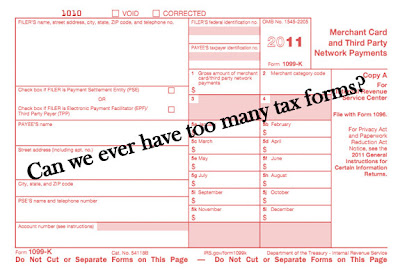Economies of scale, in terms of time spent (which really should be spent minding the business when you are short-staffed and your every minute is critical) as well as payroll service and accounting dollars expended are especially acute when it comes to the operation of a small business. There are federal, state and local forms, special employer reports, withholding, disability, FICA, and a multitude of time-- and resource-consuming records to be kept and reports to be filed to maintain compliance with the law.
Using independent contractors seemed like a part of the solution to this black hole in productivity and record keeping, but the Internal Revenue Service began to impose some strict tests to determine exactly what manner of person (natural or encapsulated in an entity) qualified as an independent contractor, and what additional forms had to be filed even if he/she/it was, in fact an independent contractor.
Non-compliance (failure to remit taxes withheld, failure to timely file reports) was, and still is not an option. The cost of an audit can be prohibitive in terms of professional representation and time; adding interest and penalties to this unwieldy mountain of pain has sunk many a small business or entrepreneurial enterprise. If you cannot afford compliance, you cannot afford to even be in business.
If you are engaged in online selling or e-commerce, in general, the IRS is now requiring a new an exciting form, the 1099-K to ensure that online sellers report their sales and income properly. And to be certain that you are in compliance with requirements relating to this form, the IRS has enlisted (i.e., mandated under penalty of law) merchant payment processors -- the clearing houses between sellers and customers - to keep certain records of your business' online sales, and send these forms to you, as well as to the government authorities involved.
A brief article follows which helps to clarify what this is all about, what to expect, and what you must do. When you've finished reading this article by clicking on the source hyperlinks, please hit the "BACK" button on your browser and come back to this page for some additional words to the wise. Don't worry -- take your time to read the article thoroughly before you return - the bus won't leave without you. Promise.
---------------
How the 1099-K will change small-business record keeping
A new tax form, called the 1099-K, is being introduced to make sure online sellers report their income correctly. The new form, which payment processors will send to merchants that exceed a certain sales threshold, might be incentive for small-business owners to step up their record-keeping efforts, said Steven Aldrich of Outright.com. "The problem is that most small business owners are still using paper and pencil and spreadsheets to track their business data. This reporting is really a clarion call to move those people into the digital age," he explained. [CLICK ON EITHER OF THE FOLLOWING HYPERLINKS TO READ THE ENTIRE ARTICLE] Bloomberg Businessweek , Entrepreneur.com/The Daily Dose blog
---------------
Some more tips for small business owners and entrepreneurs in general:
1) Use a professional third-party payroll service if possible. It saves some time and adds an additional layer of liability between your company and the taxman;
2) Have your bookkeeper use reliable software (many small companies use QuickBooks, but there are other programs, even some specific to certain types of industries and businesses) to constantly keep track of all business inflows and outflows, and to have them all neatly categorized and backed up daily. You should be able to get a complete printout of all of the transactional information relating to your business within an hour's notice. Insist upon getting frequent regular reports - you might be amazed at just how useful these reports can be in terms of telling you where your problems might be (and attention required), and how well you're doing on other fronts.
3) Have a reputable independent CPA (or, preferably a firm of CPAs where there is 'peer review') prepare all of your important tax returns. Research your accountant before you choose -- if your return is prepared by an accountant who has had many of his clients audited, you might be unknowingly getting your tax return internally red-flagged.
4) If the IRS or any other tax agency wants to review or audit your books and records, refer them to your accountant or tax attorney, and be certain that the audit is conducted at your accountant's or attorney's office. This tends to reduce intimidation and time consumption.
5) Always be current with every aspect of your withholding and reporting compliance. Any delays can be incredibly expensive, and can damage your business in terms of its reputation, credit standing or its very existence. Be conservative. Play it extra safe. Take your business risks in other areas where they can possibly generate substantial returns.
Douglas E. Castle for The InfoSphere Business Alerts And Intelligence Blog and The Business And Project Planning And Management Blog
INFOSPHERE* BUSINESS ALERTS AND INTEL - BREAKING NEWS...

Tweet








1 comment:
Hello! Thanks for sharing your article. It is very informative and helpful. Good thing I've come across this site while surfing. I just thought to share this website I've visited prior to your blog, I find it very helpful, especially for people like us. Here's the link (http://goo.gl/ZaAUYp), check it out.I know the software is free if you invite a couple of friends to try it out as well using this link goo.gl/oQvpJF
Post a Comment